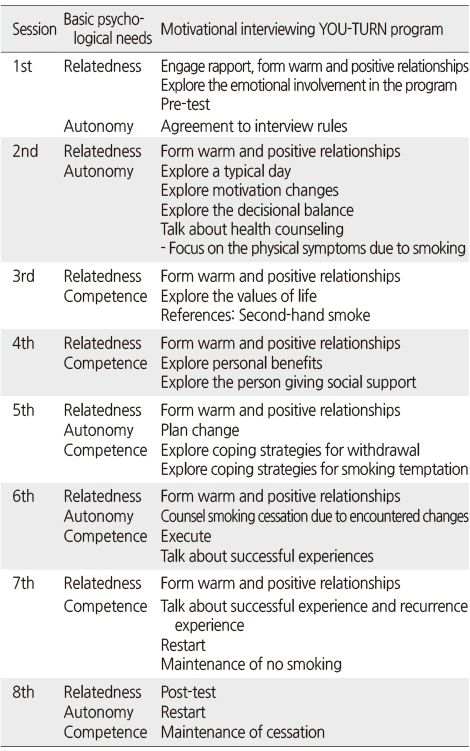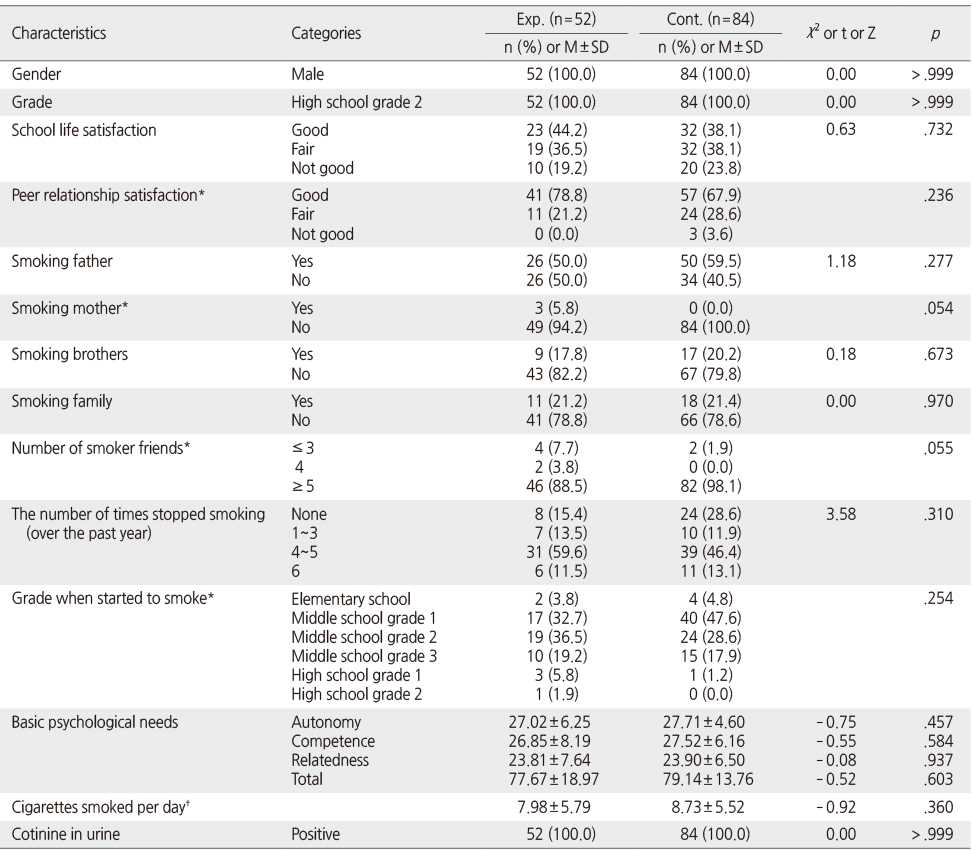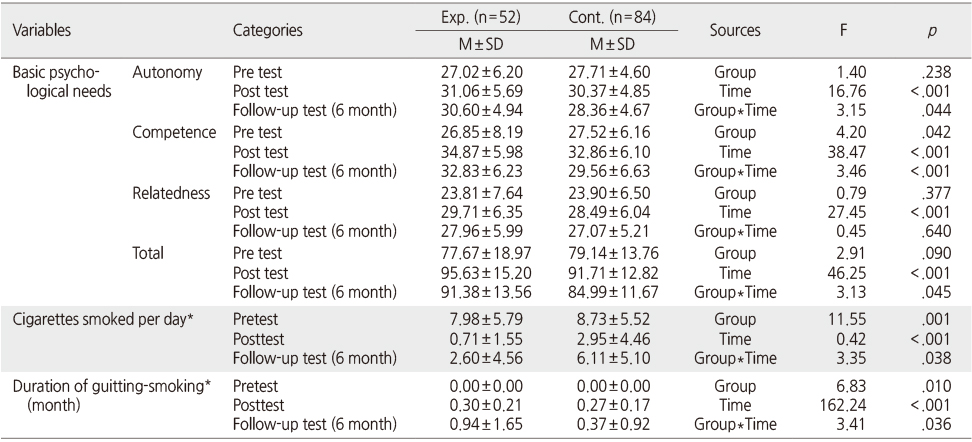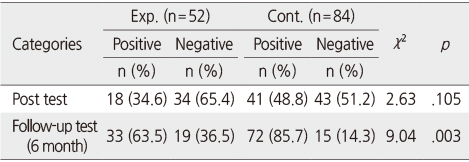Articles
- Page Path
- HOME > J Korean Acad Nurs > Volume 45(3); 2015 > Article
-
Original Article
- Effectiveness of the Self-determination Theory based a Motivational Interviewing YOU-TURN Program for Smoking Cessation among Adolescents
- Young Sun Ha, Yeon Hee Choi
-
Journal of Korean Academy of Nursing 2015;45(3):347-356.
DOI: https://doi.org/10.4040/jkan.2015.45.3.347
Published online: June 30, 2015
1Department of Nursing, Sunlin College, Pohang, Korea.
2College of Nursing, Kyungpook National University, Daegu, Korea.
- Address reprint requests to: Choi, Yeon Hee. College of Nursing, Kyungpook National University, 680 Gukchaebosang-ro, Jung-gu, Daegu 700-422, Korea. Tel: +82-53-420-4926, Fax: +82-53-421-2758, yeonheechoi@naver.com
© 2015 Korean Society of Nursing Science
This is an Open Access article distributed under the terms of the Creative Commons Attribution NoDerivs License. (http://creativecommons.org/licenses/by-nd/4.0/) If the original work is properly cited and retained without any modification or reproduction, it can be used and re-distributed in any format and medium.
Abstract
-
Purpose
- In this study, the effectiveness of a motivational interviewing smoking cessation YOU-TURN program for adolescents was examined. The program was based on the self-determination theory.
-
Methods
- The study was carried out with a nonequivalent control group pretest-posttest design. Participants in the present study were 136 high school students living in D city. The students were assigned to the experimental group (n=52) who participated in the motivational interviewing smoking cessation YOU-TURN program based on self-determination theory, or to the control group (n=84) who participated in a general smoking cessation program. Data were collected from September 1, 2013 through April 30, 2014. Collected data were analyzed using SPSS PC+ 21.0 with Chi-square test, Fisher's exact test, t-test, Mann-Whitney U test, Repeated Measures ANOVA, and MANOVA-Wilk's Lambda.
-
Results
- The experimental group had a significant increase in basic psychological needs, and duration of quitting-smoking in comparison with the control group. The experimental group had a significant decrease in cigarettes smoked per day and cotinine in urine in comparison with the control group.
-
Conclusion
- The motivational interviewing YOU-TURN program, when delivered to adolescents who smoked, was effective in discouraging smoking, and can be utilized as an effective nursing intervention for adolescents who smoke.
This manuscript is based on a part of the first author's doctoral dissertation from Kyungpook National University.
- 1. Ministry of Education. Ministry of Health and Welfare. Korea Centers for Disease Control and Prevention. The ninth Korea youth risk behavior web-based survey. Seoul: Author; 2013.
- 2. Chung HK. A phenomenological approach to high school student's smoking experiencing. J Korean Acad Nurs. 2001;31(4):610–618.ArticlePDF
- 3. Lim Y, Lee JH, Kim SI, Hahm JS. Adolescent smoking behavior: Personality, motivation, craving, nicotine dependence. Korean J Youth Stud. 2003;10(3):461–479.
- 4. Yi YJ, Lee KJ, Kim YS. Influences of demographic, smoking, and smoking cessation factors on smoking cessation success in adolescent smokers. J Korea Contents Assoc. 2011;11(4):303–311. Article
- 5. Kim YS, Jeong BR. An analysis of articles related to smoking and smoking cessation of Korean adolescents. J Korean Acad Community Health Nurs. 2010;21(1):53–62. Article
- 6. Kim HK, Park JY, Kwon EJ, Choi SH, Cho HI. Efficacy of smoking cessation and prevention programs by intervention methods: A systematic review of published studies in Korean journals during recent 3 years. Korean J Health Educ Promot. 2013;30(5):61–77. Article
- 7. Im SH, Choi HS, Kwon SJ, Kim SJ, Kim KH. Development of a youth game addition intervention program based on the self-determination theory: Preliminary research for the development of win-me gameTM. Korean J Health Psychol. 2012;17(4):861–883.Article
- 8. Kim YS, Lee KJ, Yi YJ. Comparison of the characteristics of smoking cessation success between short-term and long-term success groups. J Korean Acad Community Health Nurs. 2009;20(2):251–258.
- 9. Deci EL, Ryan RM. Facilitating optimal motivation and psychological well-being across life's domains. Can Psychol. 2008;49(1):14–23. Article
- 10. Ha YS, Choi YH. Effectiveness of a motivational interviewing smoking cessation program on cessation change in adolescents. J Korean Acad Nurs. 2012;42(1):19–27. ArticlePubMed
- 11. Kohler CL, Schoenberger YM, Tseng TS, Ross L. Correlates of transitions in stage of change for quitting among adolescent smokers. Addict Behav. 2008;33(12):1615–1618. ArticlePubMed
- 12. Slesnick N, Meyers RJ, Meade M, Segelken DH. Bleak and hopeless no more. Engagement of reluctant substance-abusing runaway youth and their families. J Subst Abuse Treat. 2000;19(3):215–222.PubMed
- 13. Deci EL, Ryan RM. The "what" and "why" of goal pursuits: Human needs and the self-determination of behavior. Psychol Inq. 2000;11(4):227–268. Article
- 14. Miller WR, Rollnick S, Conforti K. Shin SM Kwon JO Son MJ . Motivational interviewing: Preparing people for change. 2nd ed. New York, NY: Guilford Publications; 2002.
- 15. Patrick H, Williams GC. Self-determination theory: Its application to health behavior and complementarity with motivational interviewing. Int J Behav Nutr Phys Act. 2012;9:18ArticlePubMedPMC
- 16. Park GR, Kim HS. Effects of a group counseling integration program on self-determination and internet addiction in high school students with tendency to internet addiction. J Korean Acad Nurs. 2011;41(5):694–703. ArticlePubMed
- 17. Lee E, Park JW. A structural equation model on health behavior adherence for elders with prehypertension: Based on self-determination theory. J Korean Acad Fundam Nurs. 2012;19(3):343–352.Article
- 18. Cho JH. Effects of a motivation-enhanced weight loss program for women with abdominal obesity: Based on the self-determination theory [dissertation]. Seoul, Korea University. 2012.
- 19. Williams GC, McGregor HA, Sharp D, Levesque C, Kouides RW, Ryan RM, et al. Testing a self-determination theory intervention for motivating tobacco cessation: Supporting autonomy and competence in a clinical trial. Health Psychol. 2006;25(1):91–101. ArticlePubMed
- 20. Lee M, Kim A. Development and construct validation of the basic psychological needs scale for Korean adolescents: Based on the self-determination theory. Korean J Soc Pers Psychol. 2008;22(4):157–174.Article
- 21. Waltz CF, Bausell BR. Nursing research: Design statistics and computer analysis. Philadelphia, PA: F. A. Davis Company; 1981.
- 22. Korea Health Promotion Foundation. END: Experience new days. Seoul: Author; 2012.
- 23. Jeon SH, Sihn M, Yoo MS. Analysis of the structural relationships among parental monitoring, self-determination, and happiness. Korean J Play Ther. 2011;14(2):73–87.
- 24. Choi J, Park DJ, Noh GY. The content analysis of Korean smoking cessation apps for smartphone: Application of the self-determination theory. J Public Relat Res. 2013;17(2):76–110.Article
- 25. Kim MS, Kwon JH. The outcome study of cognitive behavioral and behavioral smoking abstinence program for Korean nicotine dependent adolescents. Korean J Clin Psychol. 2006;25(1):1–23.
- 26. Choe EY, Jeong SH. The effect of self-efficacy promotion smoking cessation program on the amount of smoking, CO, urine cotinine level and self-efficacy for adolescent smokers. J Korean Biol Nurs Sci. 2012;14(2):103–111. Article
- 27. Suh KH, Lee SM. Psychological factors associated with short-term and long-term abstention following a smoking cessation program. J Korean Soc Health Educ Promot. 2004;21(1):137–151.
- 28. Jee YJ, Lee H, Lim Y. Effects of a smoking cessation program using self-regulated learning strategy for middle school boys. J Korean Acad Psychiatr Ment Health Nurs. 2011;20(1):1–12. Article
REFERENCES
Figure & Data
REFERENCES
Citations

- Development and Evaluation of Motivational Interviewing Pulmonary Rehabilitation Program Based on Self-Determination Theory for Patients with Chronic Obstructive Pulmonary Disease
Jun Hee Jang, Hye Sook Min
Journal of Korean Academy of Nursing.2023; 53(2): 191. CrossRef - Reducing the Negative Environmental Impact of Consumerization of IT: An Individual-Level Approach
Ayodhya Wathuge, Darshana Sedera
Sustainability.2023; 15(16): 12160. CrossRef - Development and Effects of a Self-Determination Improvement Program for Preventing Non-Suicidal Self-Injury in Adolescents: A Pilot Study
Jae Woon Lee, In Sook Kim, Ji Won Kim
Journal of Korean Academy of Fundamentals of Nursing.2022; 29(4): 506. CrossRef - Effectiveness of Drinking Reduction Program Focused on Self-Determination Enhancement for College Students with Problematic Drinking
Jin-Kyoung Ma, Moon-Sook Yoo
Journal of Korean Academy of Nursing.2021; 51(3): 265. CrossRef - Comparison of the Prediction Model of Adolescents' Suicide Attempt Using Logistic Regression and Decision Tree: Secondary Data Analysis of the 2019 Youth Health Risk Behavior Web-Based Survey
Yoonju Lee, Heejin Kim, Yesul Lee, Hyesun Jeong
Journal of Korean Academy of Nursing.2021; 51(1): 40. CrossRef - The Effects of the Smoking Cessation Program of Life Skill Training Using Flipped Learning for Middle School Male Students
Eun Hee Seo, Eun Suk Choi
Journal of Korean Academy of Community Health Nursing.2021; 32(3): 268. CrossRef - Development and Effect of a Smartphone Overdependence Prevention Program for University Students Based on Self-Determination Theory
Myung Soon Kwon, Jeong Soon Yu
Journal of Korean Academy of Nursing.2020; 50(1): 116. CrossRef - Exploring the Basic Psychological Needs Necessary for the Internalized Motivation of University Students with Smartphone Overdependence: Applying a Self-Determination Theory
Myung Soon Kwon, Juhye Jin
Journal of Korean Academy of Psychiatric and Mental Health Nursing.2019; 28(1): 26. CrossRef - Effectiveness of a smoking cessation program on self-esteem, attitude, perception, and practice regarding control over smoking among male high school
Niyom Junnual, Chulaporn Sota, Anun Chaikoolvatana
Journal of Health Research.2019; 33(5): 366. CrossRef - Motivational interviewing for smoking cessation
Nicola Lindson, Tom P Thompson, Anne Ferrey, Jeffrey D Lambert, Paul Aveyard
Cochrane Database of Systematic Reviews.2019;[Epub] CrossRef - Effects of a Strength Based I-Change Smoking Cessation Program for Smoking Middle School Boys
Jung Hee Kim, Yeon Hee Choi
Journal of Korean Academy of Nursing.2017; 47(2): 164. CrossRef - Tobacco cessation interventions for young people
Thomas R Fanshawe, William Halliwell, Nicola Lindson, Paul Aveyard, Jonathan Livingstone-Banks, Jamie Hartmann-Boyce
Cochrane Database of Systematic Reviews.2017;[Epub] CrossRef - The Relationship between Psychological Needs and Health Promoting Behavior in Community-dwelling Older Women
Journal of East-West Nursing Research.2015; 21(2): 126. CrossRef
Motivational Interviewing Program Based on the Self-determination Theory
General Characteristics and Homogeneity between Experimental and Control Groups (N=136)
*Fisher's exact test; †Mann-Whitney U; Exp.=Experimental group; Cont.=Control group.
Comparison of Basic Psychological Needs, Cigarettes Smoked per Day, Duration of Quitting-smoking between Experimental and Control Groups (N=136)
*Multivariate analysis of variance (MANOVA)-Wilk's Lambda; Exp.=Experimental group; Cont.=Control group.
Comparison of Cotinine in Urine between Experiment and Control Groups (N=136)
Exp.=Experimental group; Cont.=Control group.
*Fisher's exact test; †Mann-Whitney U; Exp.=Experimental group; Cont.=Control group.
*Multivariate analysis of variance (MANOVA)-Wilk's Lambda; Exp.=Experimental group; Cont.=Control group.
Exp.=Experimental group; Cont.=Control group.
 KSNS
KSNS
 E-SUBMISSION
E-SUBMISSION




 Cite
Cite

